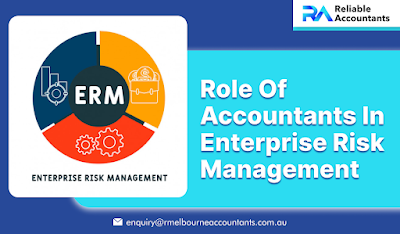Enterprise Risk Management (ERM) is a risk management methodology that considers risk management from the perspective of the whole company or organisation. It is a top-down method for identifying, assessing, and preparing for potential losses, dangers, hazards, and other forms of harm that could disrupt an organisation's operations and objectives or result in losses. Our accountants Melbourne are using ERM to influence the company's overall risk position by requiring certain business segments to disengage or engage in certain actions.
Our
tax accountants Melbourne are
recognised as risk experts who are outward-looking and provide significant
insights into risk management in a way that helps their companies adapt to
uncertainty and achieve their goals in order to contribute value.
Organisations
need to take risks and seize opportunities for achieving higher success. The
accountant's principal responsibility in ERM is to promote and assist effective
risk and opportunity management in support of value generation and preservation
across time, not just to limit risk. This entails focusing on the advantages of
careful risk-taking as well as the necessity to minimise and regulate risk. ERM
necessitates data and analysis that can indicate success or failure, as well as
decision-making around possible courses of action.
Risk
management is currently underdeveloped in many businesses, and a reactive
approach to risk management is the norm. Risk management is frequently categorised
instead of being viewed as a fundamental competency and strategic asset.
Our
accountants Melbourne professionals
in the finance department are working enough to advance ERM procedures and
outcomes in their customers’ firms. They are well-known with the risk
management principles and applied to manage opportunities and threats as part
of the existing planning and controlling management cycle in order to be
effective partners and contributors to a business.
Effective
risk management necessitates the collaboration of various parts of an
organisation and multiple processes to understand how the organisation is
exposed to uncertainty, and how this uncertainty may challenge the achievement
of business goals as well as opportunities for growth and innovation. Our tax accountants Melbourne ensures that association
is resilient, safe, and also thrives.
Our
accountants have experience with risk management and internal control as it
relates to financial reporting and risk which, if not handled appropriately,
can undermine investor trust in a company. Their involvement in these areas,
however, may lead to a mitigation attitude rather than one that promotes
business enablement and risk-taking in the context of value creation.
Enterprise
risk management encourages better dialogue on alternative options and
performance. Proactive management approaches, rather than reactive risk
registers, are used to achieve ERM. ERM integrates risk into effective
decision-making and applies to all businesses regardless of their size and
type. It aids in the alignment of strategy, risk appetite, and performance with
mission, vision, and values.
Risk
management concepts are used by professional accountants in decision support
positions in most facets of the business, including:
·
The financial and non-financial ramifications
of project or investment ideas, as well as potential alternatives.
·
Testing assumptions, sensitivity analysis of
critical variables, and designing alternative scenarios are all part of forecasting
processes done by accountants. This includes examining the positive and
negative effects that external sources may have.
·
Identification and analysis of risks, risk
weighting and risk-adjusted performance metrics, sensitivity analysis, and
scenario modelling are all risk procedures used to support decisions by the accountant.
·
Considering risk when making decisions about
planning and budgeting, performance assessment and indicator selection,
business continuity, and quality management.
Businesses
search tax accountants near me for
more services, as our accountants at smaller businesses are frequently involved
in risk management are part of their day-to-day work, especially when it comes
to offering insights into existing and future risks and possibilities related
to crucial choices like entering new markets or serving new consumer groups.
Conclusion
In
today's multicapital world, intangible assets and nonfinancial capitals such as
brand and reputation, people and culture, data, access to resources, intellectual
capital, and innovation are increasingly driving value and cash flow. Although
the value and risk in these areas cannot be fully reflected in financial terms
and by methodologies expressly designed to evaluate financial risk, such as
value-at-risk, there can be a financial and reputational risk in any of them
and these can be evaluated by accountants.
Reliable Melbourne Accountants provides various accounts services to individuals and
businesses can also access these services by searching tax accountants near me.

